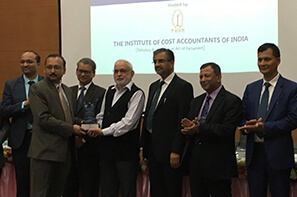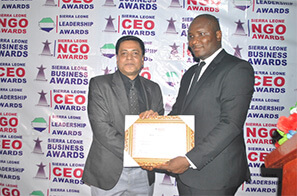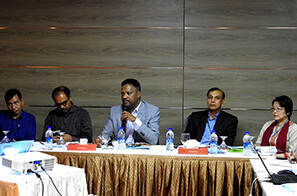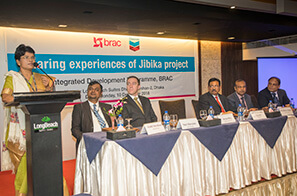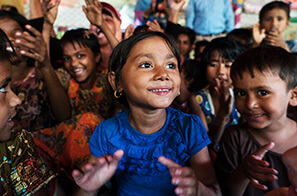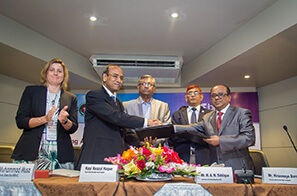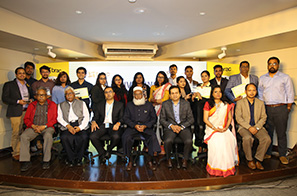
English (959)
Children categories
BRAC wins prestigious SAFA Award for best presented annual report
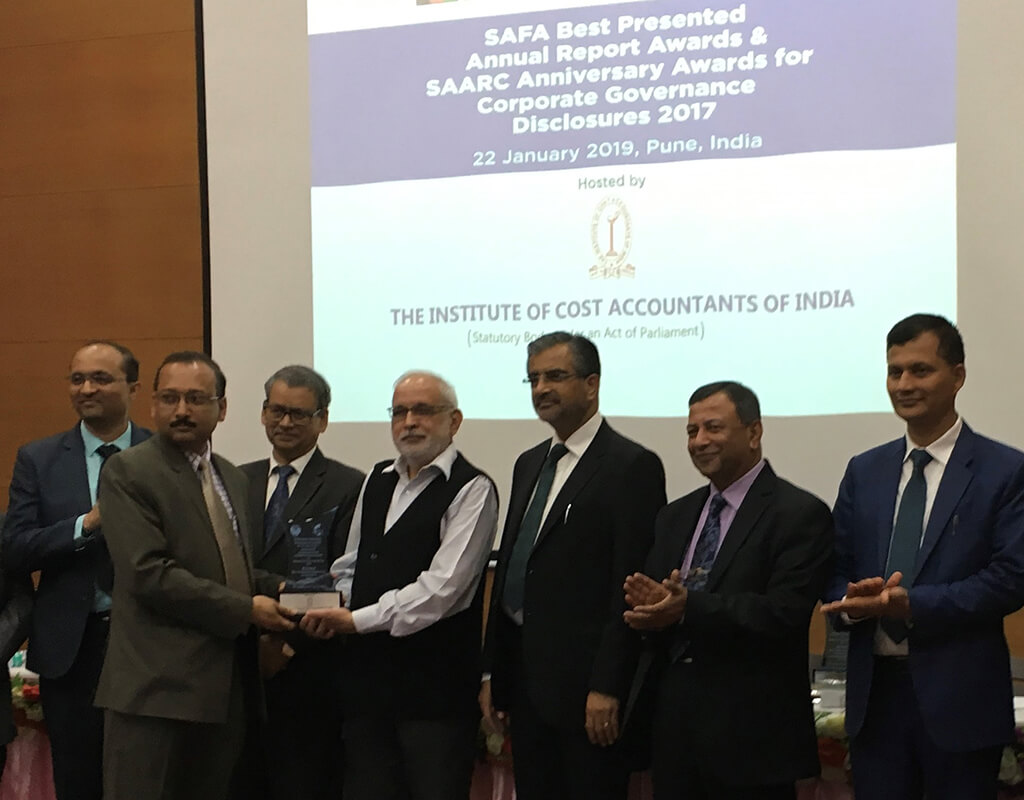
BRAC, the number one NGO in the world, has won the prestigious South Asian Federation of Accountants (SAFA) award 2017 for best presented annual report in the non-governmental organisation category. The award was handed over to BRAC at a ceremony in Pune, India on Tuesday (January 22, 2018). Tushar Bhowmik, director of BRAC’s finance department, received the award.
SAFA is a federation of organisations of accountants from all the eight SAARC (South Asian Association for Regional Cooperation) countries.
“BRAC regularly follows standard requirements in carrying out audit of its financial matters. Our objective is to ensure organisational accountability through full disclosure. We have strong corporate governance, which plays a key role in preparing a highly standard financial statement,” said Tushar Bhowmik, BRAC’s finance director, after receiving the award.
The selection for this award was made on the basis of an assessment of transparency, accountability and good governance. Last year, the Institute of Chartered Accountants of Bangladesh (ICAB) awarded BRAC for its annual report. ICAB then sent the report to SAFA to compete with the annual reports of NGOs and NOPs from other SAARC countries. BRAC was nominated for the award following an assessment of all the entries in this category.
অভিবাসন মিডিয়া অ্যাওয়ার্ড ২০১৮
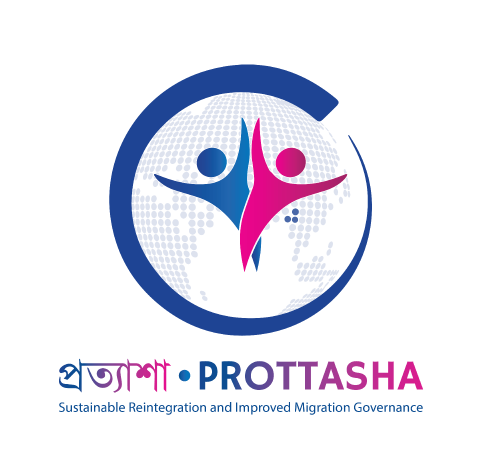
![]()
আন্তর্জাতিক অভিবাসন সংস্থার সর্বশেষ পরিসংখ্যান অনুযায়ী ২৫৭ মিলিয়ন জনগোষ্ঠী (বিশ্ব জনসংখ্যার ৩.৪%) কাজের জন্য বা অন্য কোনো প্রয়োজনে নিজ দেশে বাস না করে অন্য দেশে বাস করছেন এবং উভয় দেশেরই আর্থ-সামাজিক এবং সাংস্কৃতিক উন্নয়নে গুরুত্বপূর্ণ অবদান রেখে চলেছেন। বিশ্বব্যাংকের হিসাব অনুযায়ী ২০১৭ সালে ৬১৩ বিলিয়ন ইউএস ডলার প্রবাসী আয় হিসেবে বিশ্বের বিভিন্ন দেশের জাতীয় আয়ে যুক্ত হয়েছে। বিশ্বের যে কোনো দেশের মতোই বাংলাদেশের উন্নয়ন এবং সমৃদ্ধির ক্ষেত্রে অভিবাসন খাতটি অত্যন্ত গুরুত্বপূর্ণ। ২০১৮ সালে বাংলাদেশ শুধু এই খাত থেকে প্রায় ১৫ বিলিয়ন ইউএস ডলার আয় করেছে।
২০১৮ সালে বাংলাদেশে থেকে মোট ৭ লাখ ৩৪ হাজার কর্মী বিদেশ গিয়েছেন। এদের মধ্যে নারী কর্মীর সংখ্যা ১ লাখ ১ হাজার ৬০৯ জন। বাংলাদেশকে মধ্যম আয়ের দেশে পরিণত করার পেছনে অভিবাসন খাত অত্যন্ত গুরুত্বপূর্ণ ভূমিকা পালন করেছে। কিন্তু প্রয়োজনীয় তথ্যের অভাবে অভিবাসনপ্রত্যাশীরা প্রতিনিয়ত প্রতারণার সম্মুখীন হচ্ছেন। ব্র্যাক বিশ্বের সর্ববৃহৎ বেসরকারি উন্নয়ন সংস্থা। ২০০৬ সাল থেকে বাংলাদেশের অভিবাসনপ্রবণ জেলাসমূহে নিরাপদ অভিবাসন নিশ্চিত, মানবপাচার প্রতিরোধ ও সচেতনতা সৃষ্টি এবং বিদেশফেরত অভিবাসীদের পুনরেকত্রীকরণের লক্ষ্যে ব্র্যাকের মাইগ্রেশন প্রোগ্রাম কাজ করে যাচ্ছে। প্রতিবছর প্রবাস থেকে অনেক মানুষ দেশে ফেরত আসে। কিন্তু তাদের বিষয়টি একেবারে উপেক্ষিত থেকে যায়। বিষয়টির গুরুত্ব বিবেচনা করে ইউরোপীয় ইউনিয়নের অর্থায়নে ও আন্তর্জাতিক অভিবাসন সংস্থার (আইওএম) সহযোগিতায় ব্র্যাক মাইগ্রেশন প্রোগ্রাম সারাদেশে বিদেশফেরতদের সহযোগিতা দিয়ে যাচ্ছে।
অভিবাসী কর্মী ও তাদের পরিবারের অধিকার রক্ষায় গণমাধ্যমের ভূমিকা অনস্বীকার্য ও প্রশংসনীয়। অভিবাসনবিষয়ক সাংবাদিকতাকে আনুষ্ঠানিকভাবে স্বীকৃতি দিতে ব্র্যাক ২০১৫ সাল থেকে প্রথমবারের মতো ‘অভিবাসন মিডিয়া অ্যাওয়ার্ড’ দেওয়া শুরু করে। এরই ধারাবাহিকতায় বস্তুনিষ্ঠ অভিবাসন সাংবাদিকতাকে অনুপ্রাণিত করতে ‘অভিবাসন মিডিয়া অ্যাওয়ার্ড’ ২০১৮ ঘোষণা করা হবে। এটি হবে চতুর্থ অভিবাসন মিডিয়া অ্যাওয়ার্ড।
যেসব বিভাগে/ক্যাটাগরি ‘অভিবাসন মিডিয়া অ্যাওয়ার্ড’-২০১৮ প্রদান করা হবে
(ক) সংবাদপত্র (জাতীয়): অভিবাসন বিষয়ে দেশে ও বিদেশে যে কোনো জাতীয় সংবাদপত্রে প্রকাশিত প্রতিবেদন।
(খ) সংবাদপত্র (আঞ্চলিক): অভিবাসন বিষয়ে বাংলাদেশের যে কোনো আঞ্চলিকসংবাদপত্রে প্রকাশিত প্রতিবেদন।
(গ) টেলিভিশন: অভিবাসন বিষয়ে দেশে ও বিদেশে যে কোনো বেতারে সম্প্রচারিত অনুষ্ঠান/প্রতিবেদন।
(ঘ) রেডিও: অভিবাসন বিষয়ে দেশে ও বিদেশে যে কোনো বেতারে সম্প্রচারিত অনুষ্ঠান/প্রতিবেদন।
(ঙ) অনলাইন: অভিবাসন বিষয়ে দেশে ও বিদেশে যে কোনো অনলাইন পত্রিকায় প্রকাশিত প্রতিবেদন।
(চ) আলোকচিত্র: অভিবাসন বিষয়ে দেশে ও বিদেশে যে কোনো গণমাধ্যমে প্রকাশিত আলোকচিত্র।
(ছ) ব্লগ: অভিবাসন বিষয়ে দেশ ও বিদেশে যে কোনো ব্লগে প্রকাশিত ব্লগ।
প্রতিবেদন/অনুষ্ঠান/আলোকচিত্রসমূহের প্রকাশ/প্রচারের সময়সীমা
সংবাদপত্র, বেতার, টেলিভিশন, অনলাইন সংবাদমাধ্যম অথবা ব্লগে দেশে অথবা প্রবাসে কর্মরত যেকোনো বাংলাদেশি সাংবাদিক, ব্লগার অথবা গণমাধ্যম ব্যক্তিত্ব আবেদন করতে পারবেন। অভিবাসনবিষয়ক প্রতিবেদন/অনুষ্ঠান/আলোকচিত্রসমূহ অবশ্যই ১লা জানুয়ারি, ২০১৮ থেকে ৩১ শে ডিসেম্বর, ২০১৮ র মধ্যে প্রকাশিত/প্রচারিত হতে হবে।
যোগ্যতা ও সতর্কতা
অ্যাওয়ার্ডের জন্য জমা দেওয়া প্রতিবেদন/অনুষ্ঠান/আলোকচিত্রসমূহের স্বত্বাধিকারনিশ্চিত করতে হবে। সংবাদপত্রে প্রকাশিত প্রতিবেদন/আলোকচিত্রসমূহের অনলাইন লিংক এবং টেলিভিশনে প্রচারিত প্রতিবেদন/অনুষ্ঠানের ইউটিউব লিংক প্রতিবেদনের সঙ্গে জমা দিতে হবে। যদি অনলাইন লিংক বা ইউটিউব লিংক না থাকে সেক্ষেত্রে সংশ্লিষ্ট গণমাধ্যমের সম্পাদক/বার্তা সম্পাদক কর্তৃক নির্ধারিত সময়ের মধ্যে (১লা জানুয়ারি, ২০১৮- ৩১ শে ডিসেম্বর, ২০১৮) সংবাদ/অনুষ্ঠানটি প্রচারিত হয়েছে মর্মে (প্রকাশ/প্রচারের তারিখ উল্লেখসহ) সত্যায়নপত্র সংযুক্ত করতে হবে।
- অসম্পূর্ণ/ভুল তথ্যসংবলিত আবেদন বাতিল বলে গণ্য হবে।
আবেদন করার নিয়ম
১. শুধুমাত্র বাংলাদেশি সাংবাদিক, গণমাধ্যমে ব্যক্তিত্ব এবং ব্লগাররা এই অ্যাওয়ার্ডের জন্য আবেদন করতে পারবেন।
২. আবেদনকারীকে অবশ্যই তাঁর জীবনবৃত্তান্ত যথাযথ ফরমেটের মাধ্যমে (ফরমেটটি সর্বশেষ পাতায় সংযুক্ত) পাঠাতে হবে। প্রয়োজনীয় নথি হিসেবে প্রতিবেদন, আলোকচিত্র যে মাধ্যমে প্রকাশিত হয়েছে তার বিবরণ জমা দিতে হবে।
৩. আবেদনকারী তাঁর কর্মজীবন সম্পর্কে অর্ধেক পাতার মধ্যে সংক্ষিপ্ত বিবরণ (বাংলা ও ইংরেজি ভাষায়) সংযুক্ত করে পাঠাবেন। সংযুক্ত ফরমেটটি পূরণ করে আবেদনপত্রের সঙ্গে পাঠাতে হবে।
মূল্যায়ন মানদন্ড
অভিবাসন খাত, অভিবাসী ও শরণার্থী কিংবা তাদের পরিবারের অধিকার রক্ষায় গুরুত্বপূর্ণ ভূমিকা রাখে এমন প্রতিবেদন (প্রকাশিত বা সম্প্রচারিত)।
‘অভিবাসন মিডিয়া অ্যাওয়ার্ড’২০১৮-তে যেসব বিভাগ/ক্যাটাগরি বিবেচনায় আনা হবে
১. প্রিন্ট মিডিয়ার প্রতিবেদনের ক্ষেত্রে (জাতীয় ও স্থানীয় উভয় ক্ষেত্রে) সংবাদপত্রে প্রকাশিত মূল কপিটি প্রেরণ করতে হবে। সংবাদপত্রের এবং প্রতিবেদকের নাম ও তারিখ অবশ্যই দৃশ্যমান হতে হবে। সংযুক্তি হিসেবে হার্ডকপি ছাড়াও সিডির মাধ্যমে সফটকপি জমা দিতে হবে।
২. বেতারের ক্ষেত্রে এএম এবং এফএম বেতারতরঙ্গে সম্প্রচারিত অনুষ্ঠান অথবা প্রতিবেদন হতে হবে। এর সঙ্গে সংক্ষিপ্ত/সম্পূর্ণ স্ক্রিপ্ট যদি বর্তমান থাকে তবে জমা দিতে হবে। নিয়মিত বেতারে সম্প্রচারিত অনুষ্ঠানের অন্তত পরপর তিনটি অনুষ্ঠানের কপি জমা দিতে হবে।
৩. টেলিভিশনের ক্ষেত্রে অবশ্যই সংক্ষিপ্ত এবং সম্পূর্ণ স্ক্রিপ্ট (যদি বর্তমান থাকে) সহকারে ডিভিডি-র মাধ্যমে জমা দিতে হবে।
৪. অনলাইন মিডিয়ার ক্ষেত্রে শুধুমাত্র প্রতিবেদনটি ওয়েবসাইটে প্রকাশিত হতে হবে এবং অনলাইনে যেভাবে প্রচারিত হয়েছে সেভাবে সংশ্লিষ্ট প্রতিবেদনটি স্ক্রিনশটসহ জমা দিতে হবে। এ ছাড়াও ইউআরএলসহ সফটকপি সিডিতে জমা দিতে হবে।
৫. আলোকচিত্রের ক্ষেত্রে আলোকচিত্রটি যেকোন মাধ্যমে প্রকাশিত হয়েছে তার কপি ও লিংক সংযুক্ত করতে হবে। গণমাধ্যমে যেভাবে প্রকাশিত হয়েছে ঠিক সেভাবেই সংশ্লিষ্ট আলোকচিত্রসহ প্রকাশিত প্রতিবেদনটি জমা দিতে হবে। হার্ডকপি ছাড়াও সফট কপি সংযুক্তি হিসেবে সিডি-র মাধ্যমে জমা দিতে হবে।
৬. ব্লগে প্রকাশিত অভিবাসন বিষয়ক লেখার একটি হার্ডকপিসহ সফট কপির লিঙ্ক সিডির মাধ্যমে জমা দিতে হবে।
৭. একজন আবেদনকারী একাধিক বিভাগে আবেদন করতে পারবেন তবে একটি বিভাগের জন্য একটি প্রতিবেদনের বেশি জমা দেয়া যাবে না।
আবেদনপত্র জমাদানের ঠিকানা:
‘অভিবাসন মিডিয়া অ্যাওয়ার্ড’ ২০১৮-র কমিটির নিকট আবেদন সরাসরি/ডাকযোগে জমা দিতে হবে।
যোগাযোগের ঠিকানা:
‘অভিবাসন মিডিয়া অ্যাওয়ার্ড’ ২০১৮
মাইগ্রেশন প্রোগ্রাম, ব্র্যাক
ব্র্যাক সেন্টার, ৭৫ মহাখালী (১২ তলা)
ঢাকা-১২১২
বাংলাদেশ
আবেদনের শেষ তারিখ
‘অভিবাসন মিডিয়া অ্যাওয়ার্ড’ কমিটির নিকট ২০১৯ সালের ২০শে ফেব্রুয়ারি বিকেল ৫টার মধ্যে আবেদন উক্ত ঠিকানায় পৌঁছাতে হবে। নির্ধারিত সময়সীমার পরে কোনো আবেদন গ্রহণযোগ্য হবে না।
বিচারকমণ্ডলী
যেসব সংস্থার সম্মানিত বিচারকমন্ডলীর দ্বারা আবেদনকৃত প্রবন্ধ/অনুসন্ধানী প্রতিবেদন মূল্যায়ন করা হবে:
১. প্রবাসী কল্যাণ ও বৈদেশিক কর্মসংস্থান মন্ত্রণালয়ের একজন প্রতিনিধি।
২. গণযোগাযোগ ও সাংবাদিকতা বিভাগের একজন শিক্ষক।
৩. নাগরিক সমাজের একজন প্রতিনিধি।
৪. গণমাধ্যম ব্যক্তিত্ব।
পুরস্কার বিতরণী অনুষ্ঠান
‘অভিবাসন মিডিয়া অ্যাওয়ার্ড’-২০১৮ অনুষ্ঠিত হওয়ার তারিখ সংশ্লিষ্টদের যথাসময়ে জানানো হবে।

BRAC Sierra Leone receives 2018’s “Most Outstanding NGO Award”
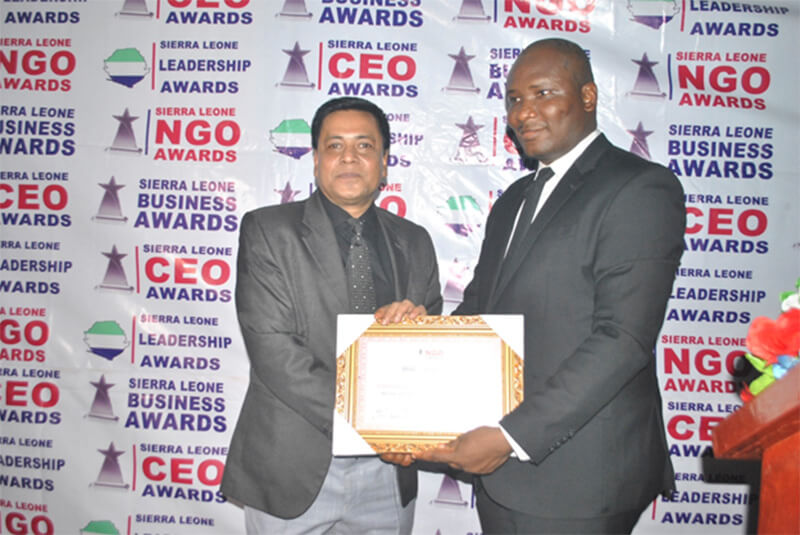
BRAC Sierra Leone has been awarded “The Most Outstanding NGO of the year - 2018,” by a consortium of national and international organisations (Council of Chief Executives in Sierra Leone, EcoMedia Corporation, Africa Media Corporation, Institute for Public Affairs and Good Governance, and the African Consulting group).
Since its inception in 2008, BRAC Sierra Leone has proved to be one of the leading international development organisations operating in Sierra Leone. The award comes in recognition of of the organisation’s demonstrated support and commitment through professional services, best practices, dynamic programmatic interventions, innovation, effectiveness, and sound principles.
Rakibul Bari Khan, Country Representative of BRAC Sierra Leone, described the award as a great honour and recognition of BRAC’s support towards the development of Sierra Leone. “The recognition is a reminder of what we are, and as an organisation, I must say, this is very overwhelming, timely, and useful. We intend to use this award to reaffirm our commitments to the government and the people of Sierra Leone,” he said.
Peter Sasellu, Chairman of the Council of Executives, described BRAC as an organisation that has presence and significant impact in most, if not all the districts in Sierra Leone. “I came to know about BRAC when I was in Liberia. BRAC has impacted the lives of millions of people in the African and Asian continent. It is one of the NGOs that I’m really proud of; their impact in the lives of our community’s people is very outstanding,” he added.
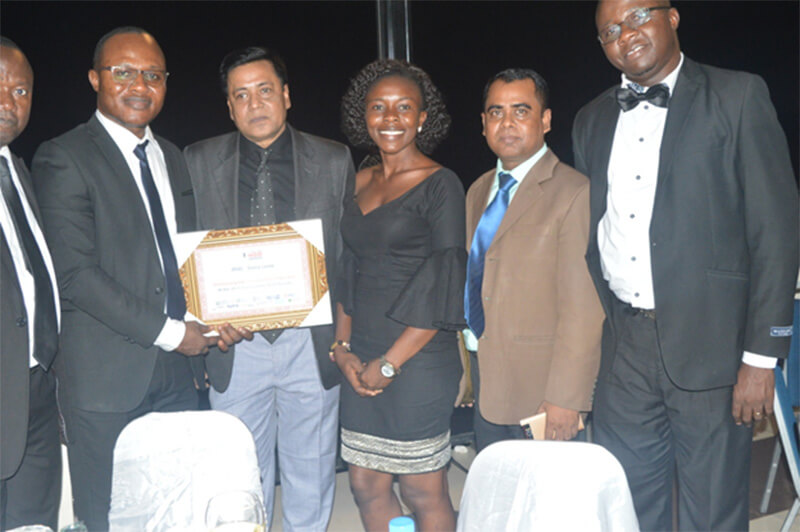 BRAC Sierra Leone staff members at the prestigious award ceremony
BRAC Sierra Leone staff members at the prestigious award ceremony
Election pledge for disease eradication demanded at roundtable
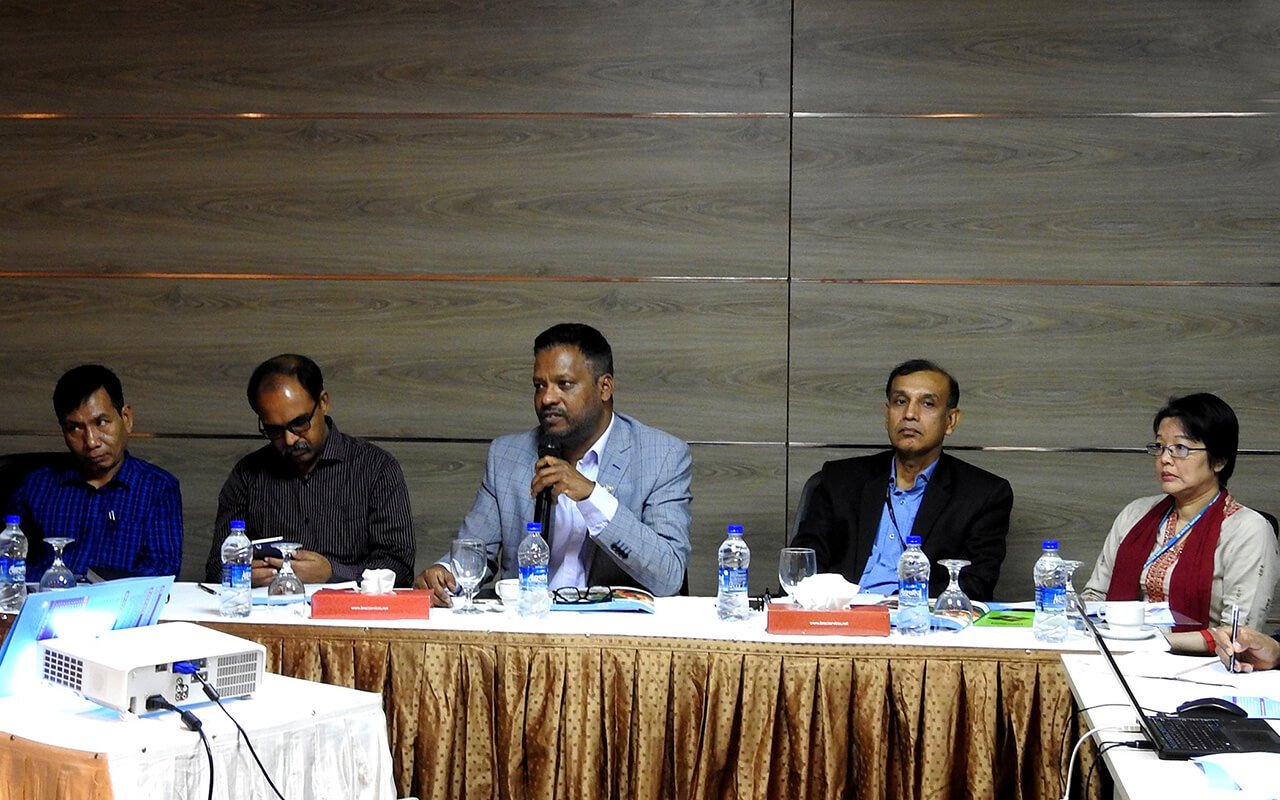
The world will need to halve the deaths from tuberculosis and reduce newly infected patients by 80 per cent to meet Sustainable Development Goals by 2030. This will essentially need stepping up effort in both TB diagnosis and prevention. The implication of the disease is so broad and deep in the country's public health that political parties should bring it into their manifestoes for the forthcoming parliamentary elections.
Speakers expressed these views today on Monday (10 December 2018) at a roundtable workshop organised at the BRAC Centre in the capital. National Tuberculosis Control Programme, Bangladesh Health Reporters Forum and BRAC jointly organised the event titled 'Ensuring TB diagnosis and prevention through proactive role'.
National TB Control Programme line director Professor Dr Md Shamiul lslam was present at the event as the chief guest. Advisor to NTP Bangladesh on Global Fund and MDR-TB Dr Md Abdul Hamid Salim presented the keynote paper, while BRAC associate director for communicable diseases programme Dr Mahfuza Rifat gave the welcome speech.
Moderated by Bangladesh Health Reporters Forum (BHRF) vice president Nurul Islam Hasib, the programme was also addressed, among others, by WHO Bangladesh medical officer for communicable diseases surveillance Dr Mya Sapal Ngon, BRAC director for communicable diseases and WASH programme Dr Md Akramul Islam, Damien Foundation country director Dr Aung Kya Jai Maug, and BHRF president Toufiq Maruf.
Professor Dr Md Shamiul lslam said, the main objective of the National TB Control Programme is to increase TB diagnosis, for which it is now focusing on applying different modern techniques.
He further observed that any decrease in donor assistance may negatively impact the country's fight against tuberculosis. But the government on its own is putting high emphasis on its control as Bangladesh is still one of the high-risk nations in TB. 'I hope that the Global Fund and other donors will continue their assistance,' he added.
Dr Md Akramul Islam, while saying the world will need to halve the deaths from TB by 2030 to meet the related SDG targets, viewed that the political parties should include this issue in their pledge for the national elections due end of this year.
He stressed strengthened work at the community level, including dissemination of TB prevention awareness messages, increase in salary and other facilities for healthcare professionals, deploying adequate number of skilled medical technicians, and ensuring treatment for all irrespective of financial condition.
Speakers mentioned that urban population in the country is in more risk of infecting TB than those living in the rural areas. In Bangladesh, number of TB patients, combining both old and new, in rural areas is 270 per 100 thousand, while it is 316 in the urban areas.
The discussants came up with several recommendations, which include putting more focus on prevention of tuberculosis and quality of drugs, stepping up effort to control urban TB, prioritising diagnosis of child TB, bringing new drugs in the market, and facilitating more in-depth reports in the mass media.
Lessons learned from the Jibika project
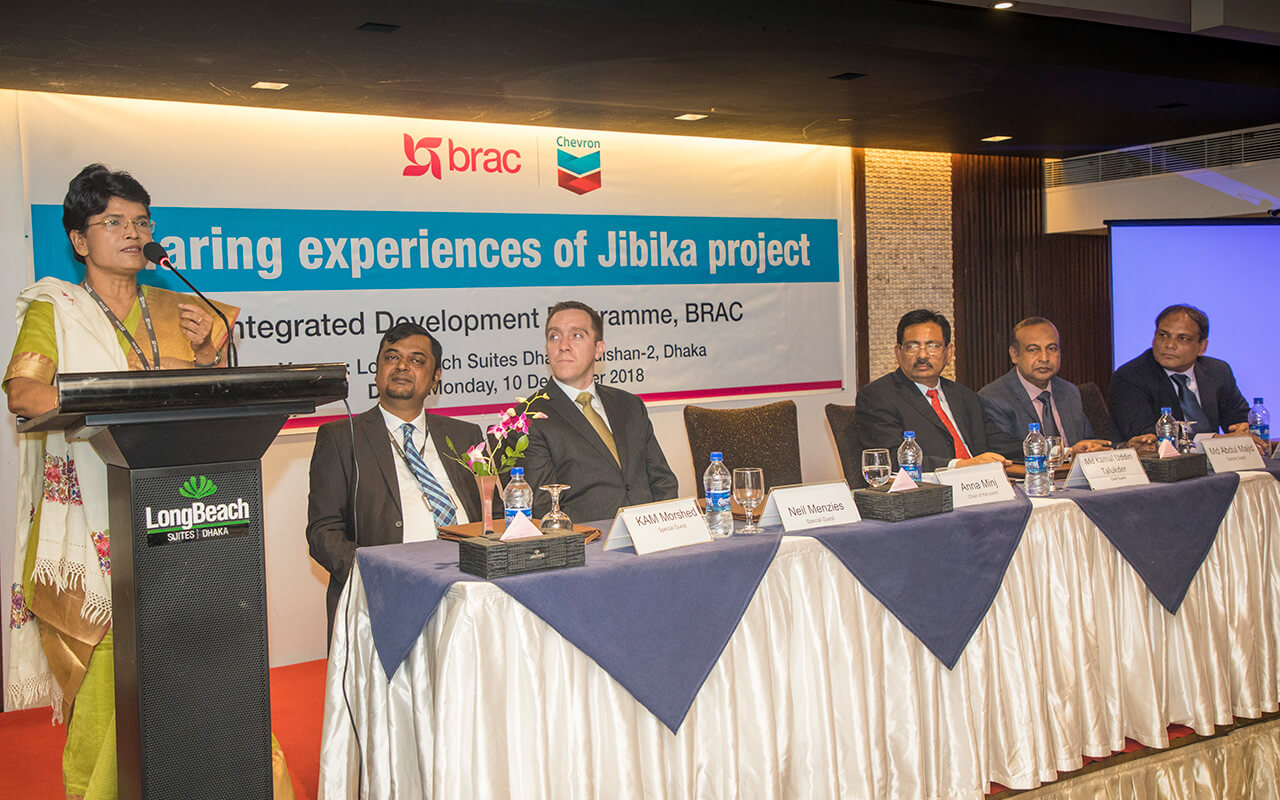
The Jibika project, a collaboration between BRAC and Chevron, implemented under BRAC’s integrated development programme, held an experience sharing event on Monday, 10 December 2018 at Dhaka to share the learnings and experiences of the three-year long project.
Md Kamal Uddin Talukder, Secretary of Rural Development and Cooperatives Division, Ministry of LGRD and Cooperatives, was present as the chief guest. Md Abdul Majid, Registrar and Director General, Department of Cooperatives, Ministry of LGRD and Cooperatives; Neil Menzies, President, Chevron Bangladesh; Ismail Chowdhury, Director, Policy, Government and Public Affairs, Chevron Bangladesh, and KAM Morshed, Director, Advocacy for Social Change, Technology and Partnership Strengthening Unit, BRAC attended as special guests. Anna Minj, Director, Community Empowerment, Integrated Development, Gender Justice and Diversity Programme of BRAC presided over the event.
Mr Talukder lauded the collaboration between BRAC, the largest development organisation in the world, and Chevron, Bangladesh’s largest international oil company, working together for the socio-economic development of vulnerable communities residing in Chevron’s areas of operation in northeast Bangladesh. President of Chevron, Neil Menzies thanked the Jibika project and the government cooperative department for their contribution in socio-economic development through the institutionalisation of community organisations.
KAM Morshed, Director, BRAC, emphasised on the value chain system and enterprise development of the community through the Jibika project, mentioning that this model can be replicated in other regions of the country, especially for the vulnerable people of the haor area.
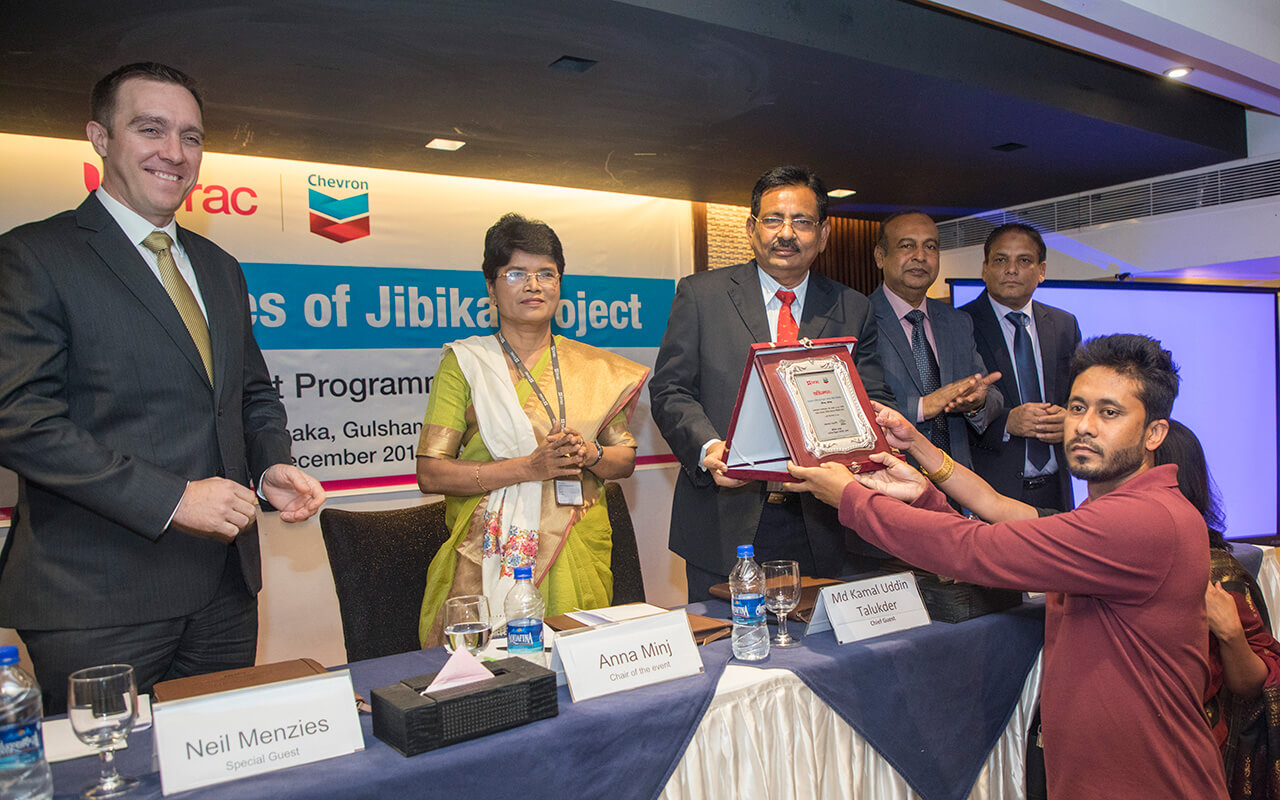
Jibika project participant Taslima Begum, President, Uttor Baluchar Zonaki Kornofuli Sharbik Gram Unnayan Shomobay Shamiti, said that the trainings and knowledge gathered from the BRAC-Chevron and IDEA’s Jibika project has helped her and other community to learn how to operate a village development organisation, how to improve enterprise through new technology, market system, and linkage with service providers. She thanked Jibika for improving her and other women’s lives of the community.
Besides sharing stories by the Jibika project participants, the Jibika model was displayed, along with a stall representing the Jibika VDO. A documentary showed two village developments, namely Amukona Village Development Organisation and Kashba Village Development Organisation from Nabiganj upazila of Habiganj district, for their recognition as best VDOs from the government cooperative for the year 2018.
The Jibika project was designed to develop local institutions and promote entrepreneurship for sustainable income growth of the marginalised farming households around the Chevron-operated gas fields in Sylhet, Moulavibazar, and Habiganj districts. Jibika’s economic development activities are steered through 112 community-based organisations known as village development organisations (VDO). IDEA, a Sylhet-based NGO has been working with BRAC as its implementing partner. About 20,000 people have benefitted since the implementation of Jibika three years ago.
The LEGO Foundation awards $100 million to Sesame Workshop to bring the power of learning through play to children affected by the Rohingya and Syrian refugee crises
New program will provide critical new insights into effective models of learning through play for children affected by crisis
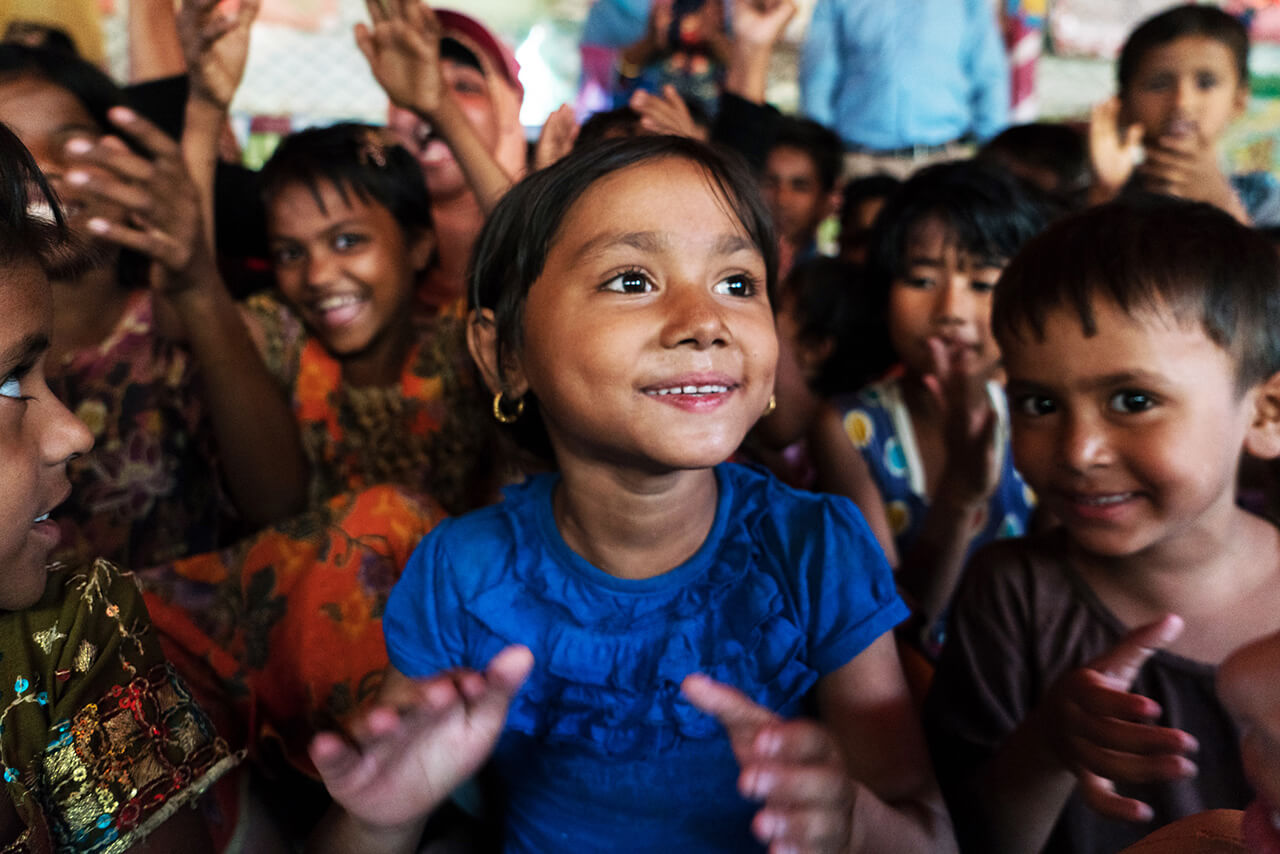
Billund, Denmark - 5 December 2018 - Today, the LEGO Foundation announced that it is awarding a $100 million grant to Sesame Workshop to ensure that young children affected by the Rohingya and Syrian crises have opportunities to learn through play and develop the skills needed for the future. Working in partnership with BRAC, the International Rescue Committee (IRC) and New York University’s Global TIES for Children, Sesame Workshop will reach children affected by crises in Bangladesh and the Syrian response region with early childhood and play-based learning opportunities.
The $100 million grant from the LEGO Foundation will benefit some of the world’s most vulnerable children and call attention to the critical importance of learning through play to set them on a path of healthy growth and development. The LEGO Foundation is the first to step up and meet the John D. and Catherine T. MacArthur Foundation’s call for the bold philanthropy needed to transform the way the humanitarian system serves children affected by crisis in early childhood.
The scale of the global refugee crisis is staggering—today, 68.5 million people are displaced worldwide. Among them are 25 million refugees, half of whom are children. As refugees experience displacement for an average of 10 years, millions of children are spending a significant part of their childhoods without access to adequate early childhood development opportunities. Adverse experiences like displacement can affect young children’s developing brains, with lasting effects on health and wellbeing. Engaging in play-based activities with responsive caregivers can help mitigate the detrimental, long term effects of displacement and trauma, ultimately giving children affected by conflict the skills they need to thrive into adulthood and rebuild their communities.
“This partnership marks the first step of the LEGO Foundation’s commitment to work within the humanitarian field to support children’s holistic development that incorporates learning through play. We hope to inspire other funders, humanitarian actors, world leaders and governments to act and urgently prioritise support for play-based early childhood development for children in humanitarian crises—a vastly overlooked but vital component in the progress of humanitarian aid. We hope that young children impacted by these crises will have opportunities to benefit from learning through play and also develop the skills needed for them to thrive in the future,” says Thomas Kirk Kristiansen, Chairman of the LEGO Foundation Board and 4th generation owner of the LEGO Group.
Less than 3% of the global humanitarian aid budget is currently dedicated to education with only a small fraction benefitting young children, despite clear evidence that early childhood interventions have immediate and long-term benefits for both children and their communities. The LEGO Foundation is committed to making a difference for children affected by conflict and displacement, to ensure a better tomorrow for all future generations.
“Research shows that not only is play vital for children’s psychological, emotional and cognitive health and development, but it also hones the resilience they need to overcome adversity and build their futures. Early adverse experiences negatively affect the development of brain architecture, which provides the foundation for all future learning, behavior and health. By providing play-based learning to children in crisis, we can help mitigate the detrimental, long term effects of displacement and trauma, ultimately giving a generation of refugee children a path forward,” says John Goodwin, CEO of the LEGO Foundation.
Sesame Workshop will use the $100 million grant to implement quality, play-based early childhood interventions, working in partnership with BRAC and IRC. This includes the following areas:
● Direct Services: Partnering with BRAC, the new program will scale up BRAC’s network of Humanitarian Play Labs to address the developmental needs of children ages 0 to 6 from Rohingya refugee and Bangladeshi host populations. BRAC’s Play Lab model is designed to give pre-school children age relevant and culturally appropriate play materials, a play-based curriculum, and safe spaces for guided play that ensures their holistic development.
New Sesame videos, storybooks, games, puzzles, and more featuring the beloved Muppets of Sesame Street will be created to foster engagement between children and their caregivers, nurture developmental needs, and build resilience for children ages 0 to 6.
The new program will also deepen the play-based learning aspects of the existing Sesame Workshop-IRC program that serves children and families affected by the Syrian conflict, including support for caregivers to better engage in playful learning with their children.
● Mass Media: Harnessing the power of the Sesame Street Muppets, Sesame Workshop will create videos focused on play to be shared through family-friendly mobile and pop-up viewings in refugee and host communities. Global Sesame content will also be used—including video content from Sisimpur, the Bangladeshi version of Sesame Street, and from a new TV series in production in the Syrian response region—to meet the unique needs of refugee and host community children.
Much of the new content will use animated and nonverbal formats, so that it can be used to address the needs of displaced children no matter where they live or what language they speak.
“Women and children bear the brunt of any humanitarian crisis, and many are traumatised by the brutal violence they have experienced. However, children are also amazingly resilient and take up every opportunity to play, learn and just be children. Children use play as a shield, even if it is for a few hours, to overcome the trauma they’ve endured, create happy memories and make new friends,” said Erum Mariam, Director, BRAC Institute of Educational Development. “With support from the LEGO Foundation and in partnership with Sesame Workshop, we will scale up our Humanitarian Play Lab model to give children from both refugee and host communities the opportunities to play and learn that are critical to their healthy development.”
“With the LEGO Foundation’s extraordinary award, Sesame Workshop and our partners have an unprecedented opportunity to reach and teach some of the world’s most vulnerable children by harnessing the power of learning through play,” said Jeffrey D. Dunn, President & CEO of Sesame Workshop. “The global refugee crisis is the humanitarian issue of our time, and we are deeply humbled by the trust the LEGO Foundation has placed in us to uplift the lives of children affected by conflict. Together with our partners at BRAC, the IRC, and NYU, we can forge a legacy for children worldwide affected by displacement, today and for generations to come.”
NYU’s Global TIES for Children has been selected as the independent evaluation partner for the program and will implement an evidence-based research and evaluation program, which will deepen understanding around play-based early childhood interventions in humanitarian contexts.
Sesame Workshop will receive the $100 million grant over a 5-year period, with funds released as established milestones are met.
###
About the LEGO Foundation
The LEGO Foundation aims to inspire and develop the builders of tomorrow; a mission that it shares with the LEGO Group. The LEGO Foundation is dedicated to building a future where learning through play empowers children to become creative, engaged, lifelong learners. Its work is about re-defining play and re-imagining learning. In collaboration with thought leaders, influencers, educators and parents the LEGO Foundation aims to equip, inspire and activate champions for play. Learn more on www.LEGOfoundation.com.
About Sesame Workshop
Sesame Workshop is the nonprofit media and educational organization behind Sesame Street, the pioneering television show that has been reaching and teaching children since 1969. Today, Sesame Workshop is an innovative force for change, with a mission to help kids everywhere grow smarter, stronger, and kinder. We’re present in more than 150 countries, serving vulnerable children through a wide range of media, formal education, and philanthropically-funded social impact programs, each grounded in rigorous research and tailored to the needs and cultures of the communities we serve. For more information, please visit sesameworkshop.org.
About BRAC
BRAC is a global leader in developing cost-effective, evidence-based programmes, and has been ranked the #1 NGO in the world for the last three years consecutively by NGO Advisor. BRAC’s vision is a world free from all forms of exploitation and discrimination where everyone has the opportunity to realise their potential. Founded in Bangladesh in 1972, BRAC acts as a catalyst, creating opportunities for people to transform their lives. BRAC uses an integrated model to change systems of inequity, through social development programmes, humanitarian response, social enterprises, socially responsible investments and a university. The organisation has an annual expenditure of more than USD 1.1 billion, with the majority self-financed from its enterprises, and operates in conflict-prone and post-disaster settings in 11 countries across Asia and Africa.
About IRC
The International Rescue Committee responds to the world’s worst humanitarian crises, helping to restore health, safety, education, economic wellbeing, and power to people devastated by conflict and disaster. Founded in 1933 at the call of Albert Einstein, the IRC is at work in over 40 countries and 28 offices across the U.S. helping people to survive, reclaim control of their future, and strengthen their communities. Learn more at www.rescue.org and follow the IRC on Twitter & Facebook.
About NYU Global TIES
Founded in 2014, New York University's Global TIES for Children is an international research center dedicated to designing, evaluating and advising on programs and policies that improve the lives of children and youth in the most vulnerable regions across the globe. Embedded within NYU’s Institute of Human Development and Social Change, and supported by NYU Abu Dhabi and the NYU Abu Dhabi Research Institute, Global TIES for Children works with some of the world’s leading non-governmental organizations and governments in low-income and conflict-affected countries to develop and evaluate innovative approaches to promoting the holistic development of children and their communities. Learn more at https://steinhardt.nyu.edu/ihdsc/global-ties.
BRAC and NHRC sign MoU to increase facility for persons with disabilities in metro rail
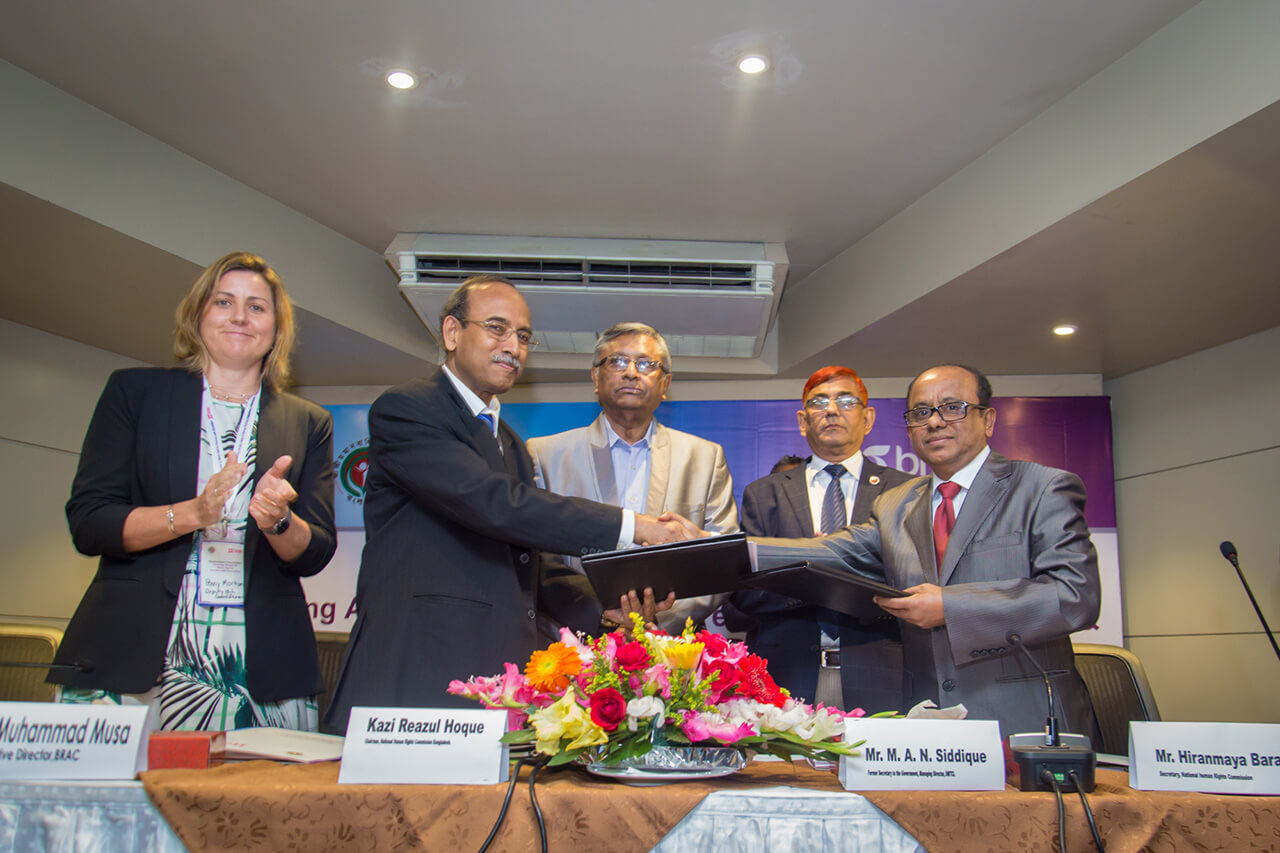
National Human Rights Commission (NHRC) chairman Kazi Reazul Hoque said the government is seriously considering the importance increasing facilities in different areas for the persons with disabilities. But the real challenge lies in the implementation. It is true to all the underprivileged communities of the country as mainstream development opportunities still largely eschew them. Their merit and potential must be put to full use for national development. Enhanced ability for safe mobility is crucial for the development of every disabled person, which is why the metro-rail system that will be introduced in the capital in the coming years must integrate features facilitating safe commuting by people with disabilities.
The NHRC chairman made these observations in his speech today on Sunday (2 December 2018) at a stakeholder consultation event organised at the BRAC Centre in the capital. He was present at the programme as the chief guest. BRAC and NHRC organised it on the occasion of National Disability Day observed on 3 December.
A memorandum of understanding was signed at the event between the two organisations with the objective of increasing facilities for the disabled people in metro rail. Hiranmaya Barai, secretary, NHRC, and Dr Muhammad Musa, executive director, BRAC, signed the MoU on behalf of the respective parties.
Under this MoU the two organisations will jointly work with the aim to ensure increased access of the disabled people to the metro rail and other public infrastructures, while also work for digitalisation to the benefit of cross sections of people.
NGO Affairs Bureau director general KM Abdus Salam, attended the event as the special guest. NHRC secretary Hiranmaya Barai, Australian deputy high commissioner Penny Morton, BRAC executive director Dr Muhammad Musa, Dhaka Mass Transit Company Limited managing director MAN Siddique, Women with Disabilities Development Foundation (WDDF) founder Ashrafun Nahar Misti, BRAC Advocacy for Social Change director KAM Morshed spoke among others at the programme.
Dr Muhammad Musa said that this MoU is not merely an agreement, but a pledge also. He stressed that BRAC is and will always stand by the disabled people.
He further said, It’s true that we are now progressing with a growth rate of over 7 per cent. The nation is advancing through the realisation of the dream we had dreamt as we fought for our national liberation. In spite of this remarkable progress our economy has a setback. It is because not every citizen is benefiting from this fruit of development. Having kept this reality in mind, we have signed this agreement so that we can work together to ensure that they have better access to facilities.
Urban Innovation Challenge: Five teams awarded
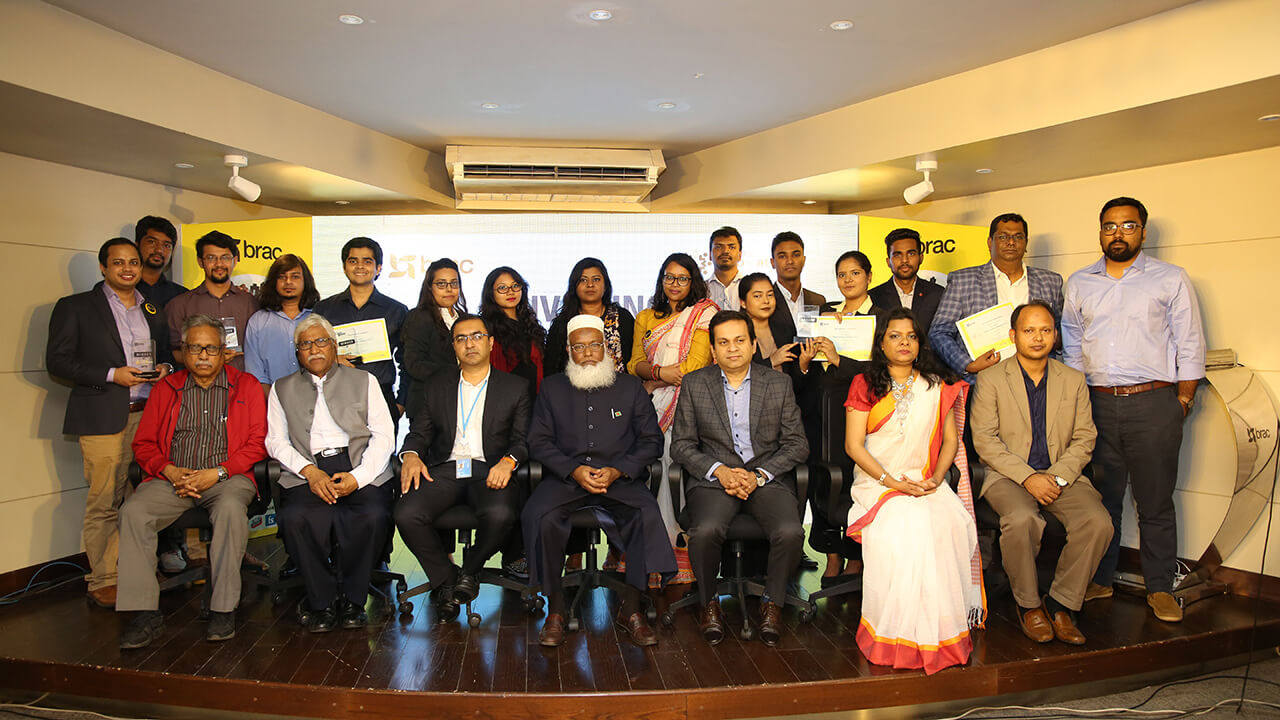
Five teams won awards in four categories for innovating effective solutions for a number of urban problems such as healthcare, housing and renewable energy at the grand finale of Urban Innovation Challenge.
Winners are Nirvana and City Bird in renewable energy category, Jotno Healthcare in healthcare category, Onushongo in low-cost housing and Drinkwell in water sanitation and hygiene categories. Responsive Urbanist received honourable mention from WASH category.
BRAC launched the Urban Innovation Challenge consecutively for the second time this year, which was themed on 'Our cities. Our solutions.' The grand finale of the competition was organised at the BRAC Centre today on Tuesday (27 November 2018). Additional secretary of the environment and climate ministry Dr Atiqur Rahman was present as the chief guest at the event.
Also present at the event were eminent environment scientist Dr Ainun Nishat, BRAC's senior director for strategy communications and empowerment and jury board member of the competition Asif Saleh, advisor to the Startup Project of the information and communication technology ministry Tina Zabeen, coordinator for the youth programme of Prothom Alo Munir Hasan, director of EMK Center in Dhaka Naveed Akbar, chief executive of Green Delta Life Insurance Farzana Chowdhury, programme head of BRAC Urban Development Programme Hasina Mushrofa and representatives from a number of non-governmental organisations.
With the objective of engaging the young people to find innovative, low-cost and effective solutions for urban problems BRAC organises this competition. This year the competition began on 24 July to receive 300 ideas at the first stage. A total of 13 ideas were selected to compete at the final stage. Although ideas were invited in five categories namely, housing, healthcare, WASH, renewable energy and climate change, no submission was made for climate change.
The winning teams will receive grants of up to Tk 5 lakh each. In addition, BRAC will assist them to work on their innovations and make it ready for practical implementation.
Dr Atiqur Rahman appreciated BRAC for its initiative to engage young people in innovative work, saying that such competitions, while bring youths opportunities to sharpen their ideas and develop their merit, help find practical solutions to many social issues.
Dr Ainun Nishat observed that there is no alternative to find innovations to ensure social progress. He also urged to find ways to effectively market rural products in the urban consumers.
Asif Saleh said BRAC puts high importance on building fruitful partnership for successful implementation of SDG. He also said, understanding a problem inside out is the most important part of any innovation exercise. For that it requires a team to be adequately dynamic and develop an efficient business plan as well, he added.
To know more about the BRAC Urban Innovation Challenge, visit http://uic.brac.net/
Observing World Day of Remembrance for road traffic victim-2018
For observing the World Day of Remembrance this year BRAC has engaged school students and arranged a rally with banners and posters showcasing the theme of #Roadshavestories and #WDoR2018. Approximately, 50 students of Shaheen school, Gazipur attended the rally holding placards while attracting the attention of local community, law enforcers and other road users. The principal and other school teachers holding banner initiated the rally. Through this rally the students displayed road safety messages to the people while remembering those who lost their lives in road crashes. #Roadshavestories #WDoR2018

Noor Mohammad a former truck driver; now a community traffic police and road safety advocate
Noor Mohammad used to be a truck driver until he crashed into a van and ended up with multiple fractures on his feet. Being a driver he could not afford the costly treatment. Ultimately, his family became poorer and children had to stop schooling. Due to overconfidence, unsafe driving, and the crash his family suffered and it took him two years to recover mentally and physically. Currently he uses a crutch to walk. Noor Mohammad now works as a community traffic police and road safety advocate motivating other drivers to drive safely and defensively.
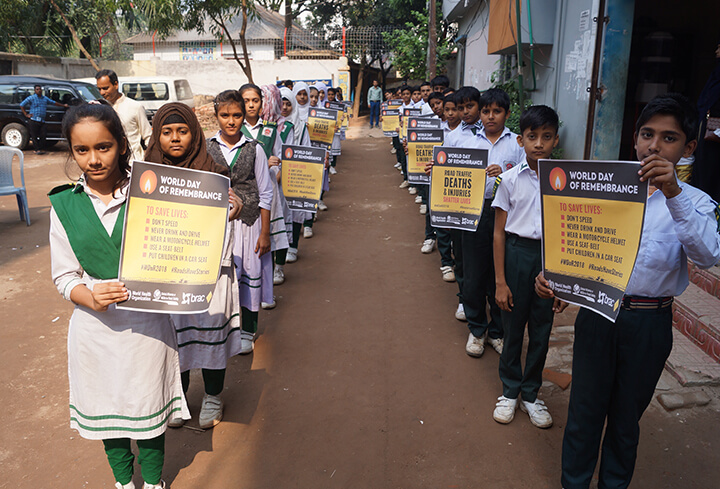 Students demanding safer roads |
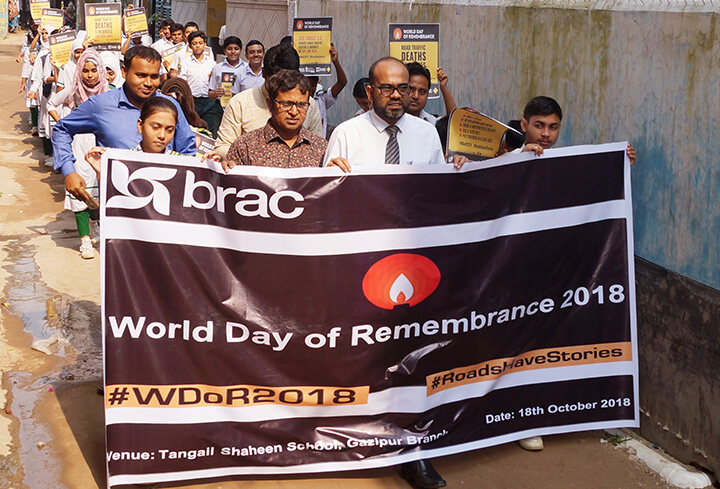 Rally participated by teachers and students |
 Students showcasing the posters for WDoR-2018 |
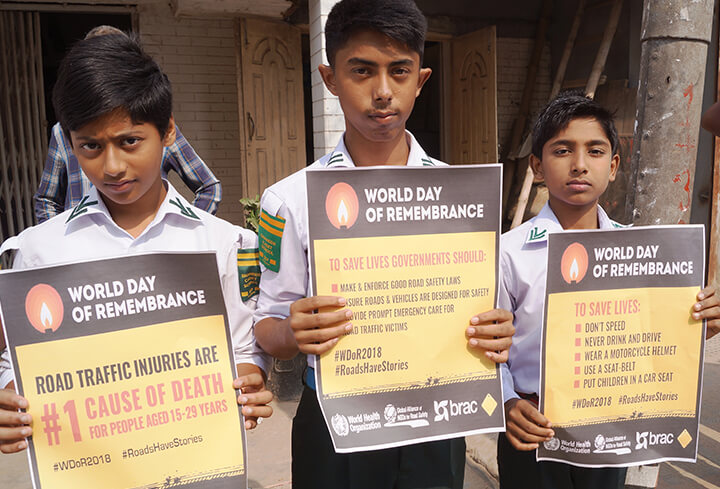 Students showcasing the posters for WDoR-2018 |
BRAC organises mental health conference
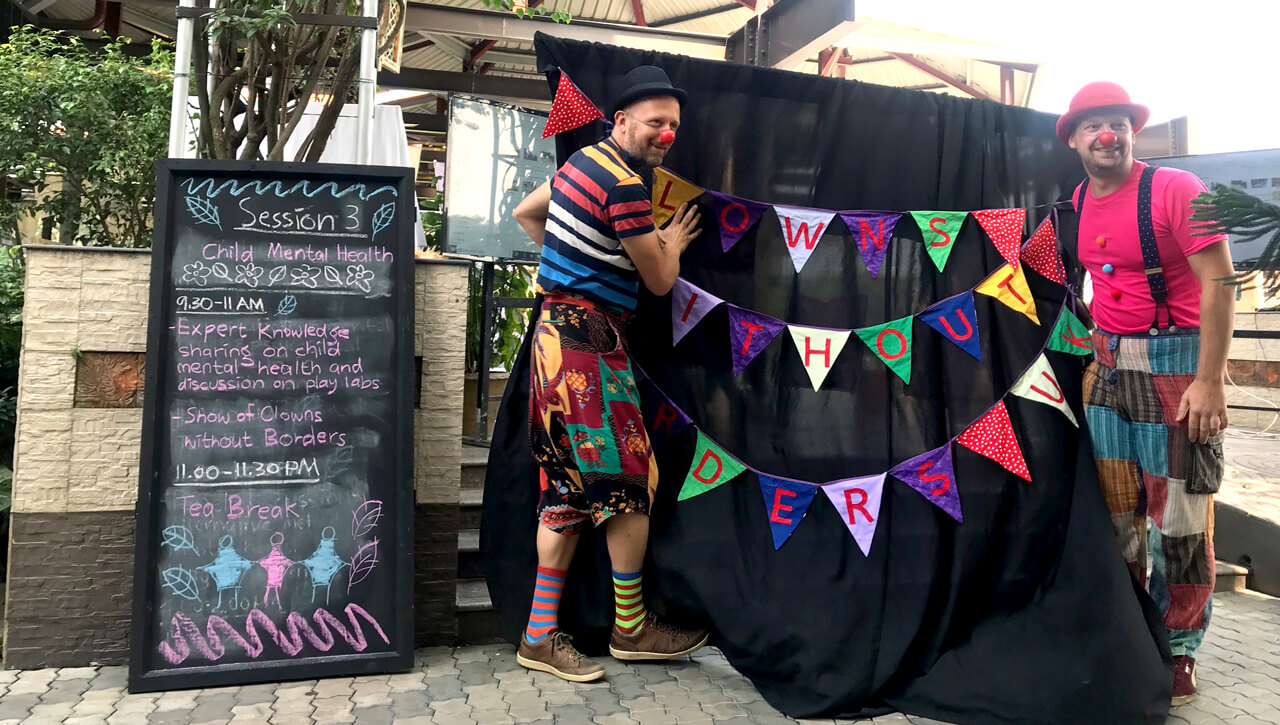
Experts at a conference observed that the government and private initiatives and resources need to better consolidate and coordinate to ensure sound mental health for all, children and adolescents in particular.
The urge came today on Monday (12 November 2018) at the concluding session of the 2-day event titled 'Let's talk and listen', organised at the BRAC CDM at Savar. BRAC Institute of Educational Development (BIED) arranged the event attended by national and international experts. The main purpose of the conference was to provide a platform to share expert knowledge, discuss successful models implemented to support mental health and promote conversations about mental health in Bangladesh.
Four sessions with four separate mental health issues were held in the conference, namely, 1. Mental health and psychosocial support in fragile settings 2. Maternal and infant mental health 3. Child mental health and 4. Adolescent mental health. Dr Nishat F Rahman, Dr Nahama Broner, Mohammad Abul Kalam NDC, Dr Helal Uddin Ahmed, Dr Jena Hamadani, Lilian Mafole, Dr Anne Glowinski, and Dr Eram Mariam spoke at the sessions.
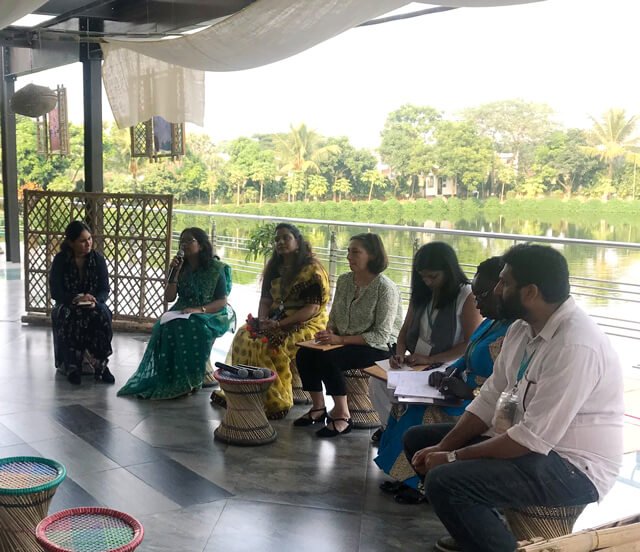 The first session's focus was alternative methods for mental health support in fragile situation. The four-tier model developed by BIED with which BRAC is providing psychosocial support to thousands of Rohingya people in Cox's Bazar was presented in this session. Second session focused on maternal and infant mental health, highlighting the importance of mother's mental wellbeing to ensure healthy upbringing of children.
The first session's focus was alternative methods for mental health support in fragile situation. The four-tier model developed by BIED with which BRAC is providing psychosocial support to thousands of Rohingya people in Cox's Bazar was presented in this session. Second session focused on maternal and infant mental health, highlighting the importance of mother's mental wellbeing to ensure healthy upbringing of children.
Speakers in the third session discussed the role of play in ensuring sound child mental health. BIED’s Play Lab Model was presented in this session, which is at present being implemented in three countries, Bangladesh, Uganda and Tanzania. Representatives from these countries shared their views and experience regarding implementation of this model in their respective environments.
The fourth session stressed high importance to the mental wellbeing of the adolescent people, calling attention to the reality that while they have many emotional issues they are often overlooked and go unheard. The session comprised case studies, narratives and interactive discussions.
Join the world’s biggest family

